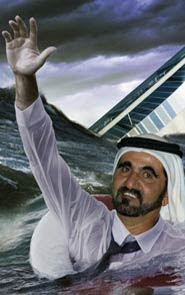
The emirate sees itself as a modern financial centre, yet reverts to authoritarianism and censorship in the face of bad press
Brian Whitaker
guardian.co.uk, Wednesday 9 December 2009
"It began with a caricature of Dubai's ruler, Sheikh Mohammed bin Rashid al-Maktoum, floundering in a sea of debt. At the Sunday Times, they probably thought nothing of it: far less flattering images of politicians appear day after day in the world's press. But in Dubai it proved too much for the authorities, and the paper was duly banned from sale in the once-gilded emirate......
Brian Whitaker
guardian.co.uk, Wednesday 9 December 2009
"It began with a caricature of Dubai's ruler, Sheikh Mohammed bin Rashid al-Maktoum, floundering in a sea of debt. At the Sunday Times, they probably thought nothing of it: far less flattering images of politicians appear day after day in the world's press. But in Dubai it proved too much for the authorities, and the paper was duly banned from sale in the once-gilded emirate......
But they can't have it both ways. If you want free markets for investors, you have to have free media, too. Markets are based on differences of opinion about the value of things. If they are to operate as intended, they need access to information. Differing opinions have to be expressed – and challenged – until eventually some kind of equilibrium is reached.
This requires a degree of openness and transparency that many in Dubai (and Arab societies more generally) find hard to accept.
There are genuine cultural differences here, between the rough and tumble of the western media – where questioning the performance of presidents and prime ministers is the routine business of journalists – and the idea that when things go wrong, fingers should not be pointed directly by naming names, or that it is unpatriotic to suggest the economy might be going down the pan.
If Sheikh Mohammed wants to be treated with the respect that he obviously feels he deserves, then he can confine himself to being a titular figurehead. But if he wants to combine being royal with life as a politician and as being the centrepiece of Dubai's business affairs he becomes fair game – just like anyone else."
This requires a degree of openness and transparency that many in Dubai (and Arab societies more generally) find hard to accept.
There are genuine cultural differences here, between the rough and tumble of the western media – where questioning the performance of presidents and prime ministers is the routine business of journalists – and the idea that when things go wrong, fingers should not be pointed directly by naming names, or that it is unpatriotic to suggest the economy might be going down the pan.
If Sheikh Mohammed wants to be treated with the respect that he obviously feels he deserves, then he can confine himself to being a titular figurehead. But if he wants to combine being royal with life as a politician and as being the centrepiece of Dubai's business affairs he becomes fair game – just like anyone else."

No comments:
Post a Comment